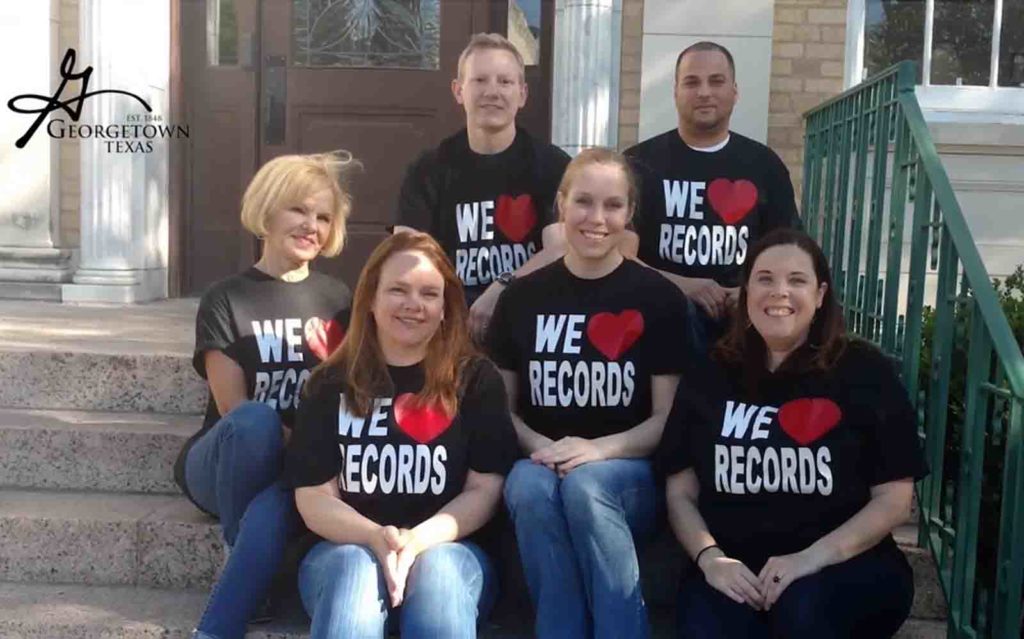Contributed by: Matthew Kunkle, Records Coordinator, City of Georgetown, TX
“I want to show my appreciation for the collaborative efforts of my entire project team, for their hard work, dedication, and innovative problem solving using Laserfiche.”
Matt Kunkle, Records Coordinator, City of Georgetown,Texas
The Georgetown City Secretary’s mission is to provide service to the city council, its constituents, and city staff by facilitating compliance with the state records’ laws, by improving processes, and by preserving history. The Records Management Program within the City Secretary’s Office provides the identification, maintenance, retention, security, and disposition of city records.
In serving a population nearing 70,000, the City of Georgetown needed to find a more efficient way to process and store their paper documents while staying compliant with the Texas State Library and Archives Commission.
The city’s Laserfiche solution has served as our shared document repository. After a pilot project using Laserfiche’s Workflow module, we scaled up usage and expanded it to departments.
The adoption of Laserfiche allowed the city to accomplish several goals:
- Improved access to documents electronically
- Saved storage space and reduced storage facility costs
- Implemented a disaster preparedness solution
- Increased the ease to disseminate information swiftly
- Kept the city in legal compliance
- Reduced retrieval times for open records requests
- Decreased the amount of time needed by staff for processing records
The Georgetown Utilities Systems Records Management Project won the city an MCCi Excellence Award for their records management processes, and they also won a prestigious Program Excellence Award from the National Association of Government Archives & Records Administration (NAGARA).
One department that appreciates the functionality of Laserfiche is the Georgetown Utility Systems (GUS) that serves approximately 42,000 accounts representing more than 62,000 customers in a 440 square-mile service area. Department records range from billing, customer service, and administration to operations, management, engineering, construction, and permits. The GUS project had minimal staff from a variety of departments to help incorporate records from a nearby utility district acquired by the City. The project team that took the lead were the Records Program Manager, along with the City Records Coordinator, Utility Records Specialist, and Information Technology Analysts. This process organized more than 79,000 archived records, and 300,000 pages scanned. The evaluation of records was vital due to the extensive retention periods that exist.
The City’s IT and Records Management staff configured Laserfiche’s batch processing tool, Quick Fields, to capture metadata and set Laserfiche’s Workflow to assign templates and annotations (such as sticky notes, highlights, and redactions). The implementation team applied document naming conventions, and automated filing processes.
This powerful tool reduced the scanning project duration from 188 days to 17 days, saving more than $82,000 in staff time!
Laserfiche Quick Fields, which reads barcodes, and Laserfiche Workflow were set up to require double entry automated confirmation- this combination yielded less than two percent of metadata errors. Laserfiche Workflow is now implemented across departments as an organizational-wide standard.
With the records management project complete, GUS set out to automate the Irrigation Rebate Forms to encourage water conservation. For customers with an underground irrigation system, the city offers a rebate to customers who choose to have their controller box inspected and set to the recommended specifications by a licensed irrigator. By automating this process, customer usage increased, and Laserfiche’s Workflow module saved an immense amount of time by reducing the number of manual entries needed by staff by 33%.
With the success of the City’s Conservation Services Irrigation Rebate Program, the challenge of processing thousands of submittal forms presented itself. Prior to implementing the Laserfiche Forms Workflow, the rebate process was paper only. With such a large customer base, this presented issues from both aspects of operational needs and from a records management standpoint. Customers were required to fill out rebate forms manually and then had to hand-deliver or mail in completed rebate forms. The process of sorting through and reviewing all incoming rebate submissions was extremely time-consuming. Frequently, rebate forms would be incomplete, contain incorrect information, they were illegible, or missing customer signatures, resulting in an extended postponement in processing. The customer would have to be contacted via phone or the rebate form was returned to the customer for revisions and resubmission.
Also, with office space at a premium and limited staff resources, storing paper records was costly and inefficient. In order to improve the rebate process and enhance customer experience, the city utilized Laserfiche to develop an electronic, automated process with Forms. Information trapped on paper forms impeded business processes and restricted the organizations’ flexibility and adaptability. Utilizing Laserfiche Forms allowed them to overcome these limitations by accurately capturing information and initiating business processes right from the start. A few of the challenges with the paper form process that were easily corrected with Laserfiche were:
- Fields Missing Information
- No Longer Having to Decipher Handwriting
- And the Best Part, Less Paper!
Laserfiche Forms enabled them to quickly and affordably extend their rebate business processes to the point of capture by implementing the process rules and management oversight, necessary to ensure accurate data collection and processing. The designed Form automated processes, streamlined operations and established system security. Furthermore, the electronic form provided them with the tools to measure the Irrigation Rebate Program success with configurable, easy-to-use, comprehensive reports. They were able to custom build a reporting feature that has proven to be a great analytic tool for monthly reports. These reports were also utilized by the billing department to dispense credits to utility customer accounts. Additionally, the designed electronic form also contains conditional logic built into the form itself, that based on the customers street number, tells them the appropriate days to water their lawn.
The Conservation Department immediately noted a drastic reduction in submitted rebates with incomplete fields or incorrect datatypes. Since implementing the Laserfiche Forms process, there is a 63% increase of rebate submissions and that now requires 40% less time to process rebates. The staff saved over 156 hours of labor per year by utilizing Laserfiche Forms for their Irrigation Rebate Program. This equates to about $12,000 in savings. Without the option of the Laserfiche Form, it would have been extremely difficult to find the time necessary to process thousands of rebates by hand.
"This process truly transformed the way our organization captures information and automates our processes. As Records Management, we wanted to ensure access, control, and preservation of electronic records according to our organization’s legal and operational requirements. With our created process, we were able to meet our organization’s operational needs and records management requirements seamlessly. Now, the process is efficient at every step, eliminating redundancies and ensuring that our employees and customers are not duplicating their effort, and it's aligned with records management best practices. I want to show my appreciation for the collaborative efforts of my entire project team, for their hard work, dedication, and innovative problem solving using Laserfiche," said Matt Kunkle, Records Coordinator.


